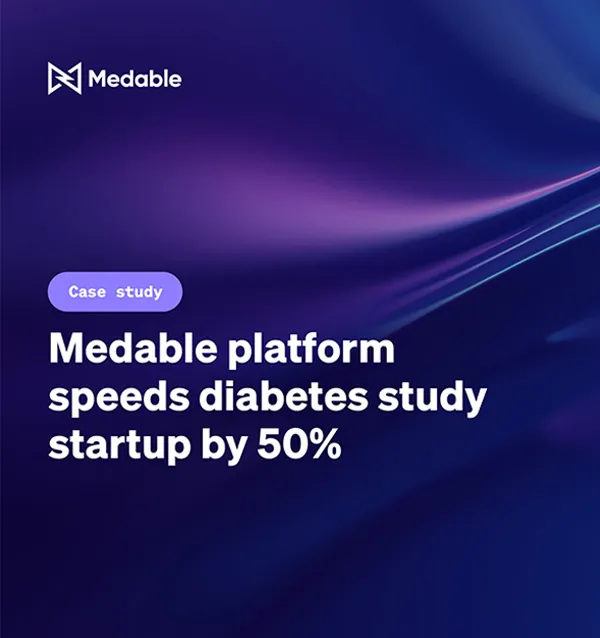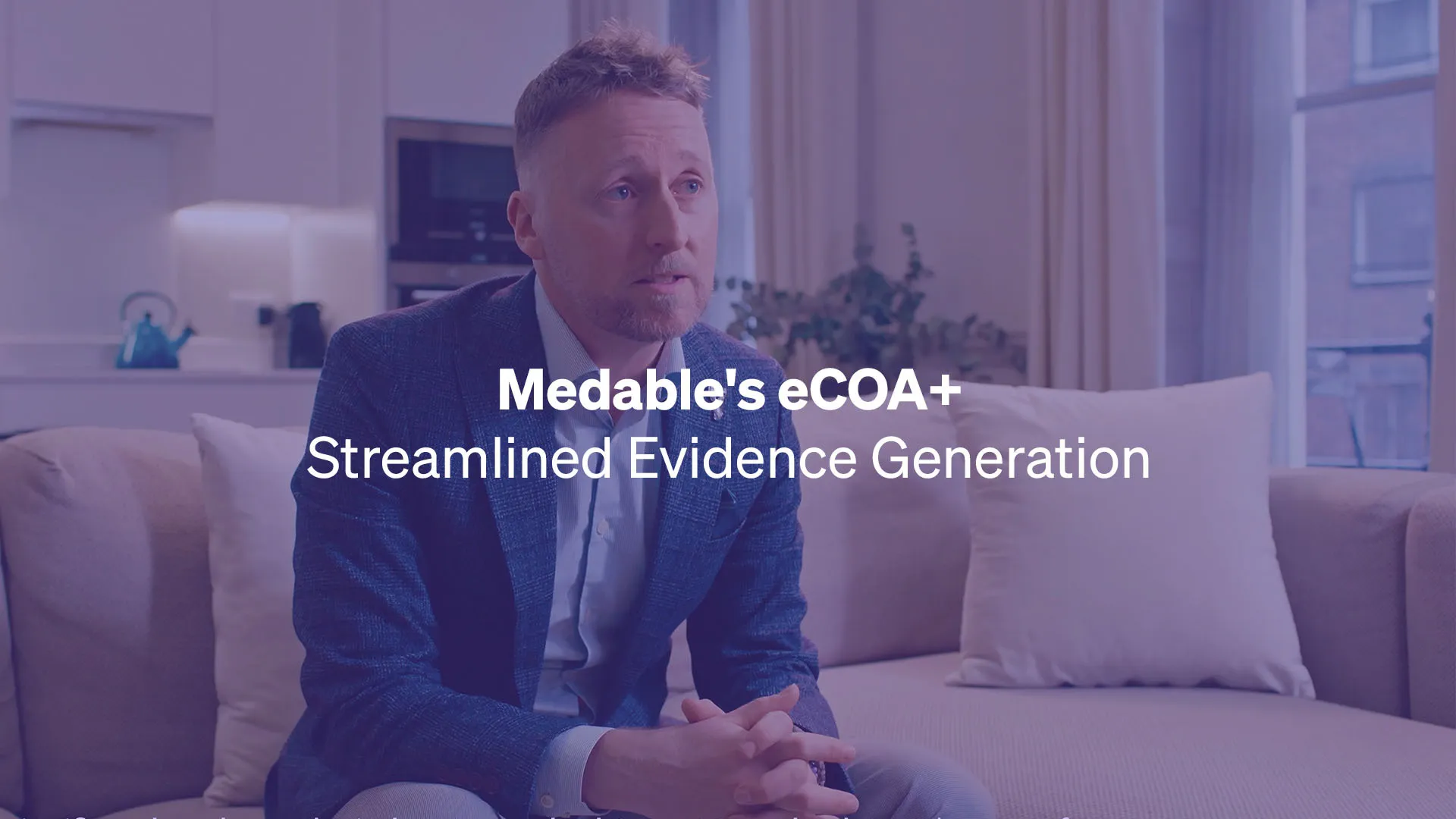
eCOA software for better clinical trials
eCOAs (electronic Clinical Outcome Assessments) and digital outcome measures delivered at industry-leading speed and quality to enhance your trial findings and fuel medical breakthroughs.
eCOA+ is part of Medable's unified data collection platform, which includes eConsent, telehealth, and sensors, with standardized integrations into your existing clinical ecosystem.

Medable eCOA+
Faster study build time
Pre-built and validated instruments
Available languages
Take eCOA off the critical path
Rapidly deploy quality studies and take eCOA off the critical path of study start-up with a reusable instrument library of 400+ standardized workflows and AI-enabled, purpose-built technology so you can work on what matters most, advancing patient care.


Unlock insights with real-time data capture
Capture objective and subjective participant data in a standardized and compliant manner. Medable’s eCOA+ combines eClinROs, ePROs, ePerfOs, eObsROs, and digital measures, so you can uncover clinically meaningful insights in real-time.
Engage patients with a better experience
Medable’s eCOA clinical trial solution improves inclusivity and accessibility, meeting the needs of patients in any geographic location and across diverse therapeutic areas, reducing burden and increasing retention.

The Medable difference
Reusable eCOA Library
Our library of 400+ reusable, pre-validated instruments, assessments and diaries ensure a standardized, consistent method of data collection that drives real-time decision making.
BYOD and provisioned devices
Accessible across web and/or mobile, provisioned devices or BYOD, unlocking patient populations that were previously out of reach while increasing patients' optionality.
Cross-platform TeleVisit
One seamless platform experience allows site and patient users to better engage and participate in a comfortable environment, reducing burden and increasing compliance.
Digital measures
Standardized integrations for sensors capturing digital physiological measures provide value across a variety of therapeutic areas including Oncology, Immunology, Cardiovascular, and more.
User friendy Platform
Consumer-grade UX, complete with notifications, reports, and submission-ready data, is vetted by our Patient Caregiver Network (PCN) and clinicians, ensuring accessibility.
24/7 Customer Support
Global customer care support throughout your trial for sites, patients and study teams. Our team ensure the best user experience to enable seamless technology adoption, protocol compliance, and overall user satisfaction.
Globally Compliant
Available in 70+ countries and 120+ locales, Medable’s platform adheres to standards set by the FDA, CFR21 Part 11, HIPAA, and GDPR.
Powered by AI
By harnessing intelligent automation, we can reduce delivery timelines by up to 50%, enabling an accelerated study start up to quickly capture novel endpoints.

A top 10 pharmaceutical company approached Medable seeking support for their Phase III diabetes study in the highly competitive weight loss market. Their primary goal was to reduce the client’s average study build timelines from 16-20 weeks, down to just 8 weeks, a reduction of more than 50%.See how Medable was able to meet the customer's goal with this case study.
Frequently asked questions
eCOA stands for electronic clinical outcome assessment and uses electronic devices like tablets, desktop computers, and phones to collect data from trial participants. Participants complete diaries, questionnaires, or other prompts to communicate how they are feeling or functioning during the course of a clinical trial. eCOAs are part of the decentralized clinical trial (DCT) methodology and are essential to understanding whether a drug is reducing symptoms and improving patients’ quality of life.
Medable’s eCOA offering is part of our broader evidence generation offering: Patient-First Data Collection. Medable’s tools allow teams to build eCOA instruments (both validated instruments and eDiaries) that meet industry standards. Data collected from this system can be used for primary endpoints in pivotal studies. Study teams can store instruments, including translations, in a library for rapid deployment in future studies. Dashboards keep teams informed of all startup activities along the way. Teams may also access their library of prebuilt, validated instruments to improve study startup.
Yes. Medable's platform is multimodal, meaning patients can access our interface through the Patient app or a web browser. A BYOD model allows patients to use their own smartphone or other device for data capture during a site visit or remotely. Participants using devices they are already familiar with may lead to better compliance and ultimately, a better clinical trial experience. However, since some participants may be hesitant to download an app on their own device, or may not own a device that meets the requirements, it’s important to anticipate a percentage of provisioned devices, even in trials adopting a BYOD strategy.
The latest in eCOA


eCOA standards and KPIs to include in your next RFI
According to Gartner, a request for information, or a request for proposal, is defined as “both the process and documentation used in soliciting bids for potential business or IT solutions required by an enterprise or government agency. The RFI document typically outlines a statement of requirements (SOR) to be met by prospective respondents wishing to make a bid to deliver the required solutions. It might cover products and/or services to meet the given requirements.”
Yet, for anyone entering into a long-term business agreement, a well-written RFI can do so much more than just assess and collect vendor capabilities.
For the last decade, Medable has been transforming the capabilities of organizations across clinical research using the latest in new technologies. In this time, we’ve learned the best RFIs are able to define what success looks like, create alignment on measurable outcomes, and establish accountability on roles and responsibilities well before a contract is ever signed. When done correctly, it becomes a decision-making framework that offers clear vision to both organizations.
Recently, Medable received two RFIs around eCOA from top pharmaceutical organizations. They stood out to us because they were structured around performance, not promises, a distinction that makes all the difference.


How to successfully transition from paper COAs to eCOA
Electronic clinical outcome assessment (eCOA) systems have reshaped how patient-reported outcome measures are collected and managed in clinical trials. Clinical operations leaders are under more pressure than ever to ensure that the migration from legacy paper instruments to digital platforms not only improves trial efficiency but also preserves data integrity, supports regulatory acceptance, and enhances participant experience.
The transition from paper to electronic capture represents a paradigm shift toward more efficient, accessible, and reliable data collection. Done well, eCOA strengthens evidence generation while reducing burden for participants and sites alike. Done poorly, it risks measurement bias, loss of comparability, and regulatory challenges.
In this article, clinical operations leaders will find evidence-based best practices for migrating and implementing patient-reported measures as part of eCOA strategies. These recommendations are rooted in published industry guidance and emerging scientific consensus, and they reflect the evolving landscape of digital assessment technologies.


Paper COAs in 2026? It’s not “cheaper,” it’s riskier
eCOA’s time has come. The market is currently estimated to be worth $2.3 billion, with projections showing it reaching nearly $5 billion by 2030. Despite this, paper still plays a prominent role for some clinical trials today.
At first glance, paper may seem simple and familiar, even economical. However, in today’s regulatory and operational environment, paper COAs are not a risk averse choice when held to the standards of what sponsors, CROs, and regulators are looking for trial data to prove.






